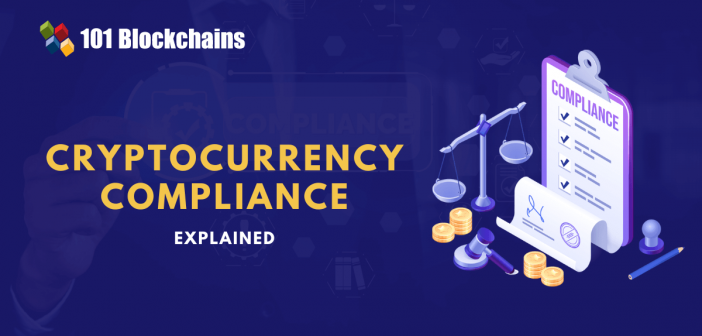Learn how blockchain truly works, master key definitions, and uncover what makes smart contracts so "smart." Dive into the fundamentals, gain valuable insights, and start your blockchain journey today!

- Cryptocurrency
James Howell
- on July 25, 2022
Cryptocurrency Compliance – A Comprehensive Guide
Cryptocurrencies have taken control over the financial world in a revolutionary manner, with many crucial value improvements. Many investors, entrepreneurs, business owners, customers, and regulators have been following the developments in the crypto world closely. As the popularity of cryptocurrencies and their adoption in real-world use cases continue increasing, the need for cryptocurrency compliance is more prominent than ever.
Why? An unregulated market could lead to a lot of chaos when it expands further, and the cryptocurrency market is the perfect example. Will compliance play a vital role in the future of cryptocurrencies? The following discussion helps you discover the importance of crypto compliance and basic terms associated with the same. You can also learn about the notable companies involved with the requirements of compliance.
Want to become a Cryptocurrency expert? Enroll Now in Cryptocurrency Fundamentals Course!
Significance of Compliance in Crypto
The growth in adoption of cryptocurrencies has been one of the biggest surprises for many crypto skeptics. The total transaction volume of cryptocurrencies amounted to almost $15.8 trillion in 2021. At the same time, the share of illegal transactions using cryptocurrencies also expanded profoundly in 2021.
The total cost of illicit transactions using cryptocurrencies amounted to almost $14 billion. As a result, governments and regulators all over the world are calling for new measures on crypto compliance and best practices for the same. The new regulations around compliance in cryptocurrencies could help in safeguarding investors.
Most important of all, the introduction of new regulations for compliance in crypto can help in tracking and avoiding illicit activities. Therefore, compliance could resolve the concerns arising from the use of crypto for illegal goods, market manipulation, money laundering, tax evasion, and terrorism financing.
Definition of Crypto Compliance
The obvious question on your mind right now would refer to “What is cryptocurrency compliance?” and it is quite important in a discussion on compliance in crypto. Escalating volumes of illegal crypto transactions has created the necessity for compliance while establishing how important it is for the crypto domain. You can define cryptocurrency compliance basically as the process of following the AML cryptocurrency regulations. The AML regulations help in safeguarding investors through the prevention of fraudulent activities.
AML or Anti Money Laundering regulations are one of the key elements in proving the significance of compliance for crypto. AML basically refers to the procedures and legal precedents which help in identifying and preventing the misuse of crypto assets and transactions for illegal activities. The basic highlights of crypto compliance include an emphasis on three important components such as,
- KYC
- KYB
- KYT
Businesses can evaluate people, wallets, transactions, and entities through the scope of AML standards for identifying and reporting suspicious activity. The AML compliance process also emphasizes user verification through the components of KYC, KYB, and KYT. User verification plays a vital role in developing trust among crypto users alongside improving credibility of the ecosystem.
Key Concepts Underlying Crypto Compliance
The answer to “Why is compliance important in crypto?” would draw attention to the working of key concepts. You can find the three essential components of KYC, KYB, and KYT as the pillars of compliance. Let us find out how they validate the significance of compliance in the domain of crypto.
-
KYC
KYC, or Know Your Customer is one of the basic highlights of crypto compliance for verifying the identity of an individual or customer. It involves the collection and storage of Personal Identifiable Information or PII of the customer. Financial institutions must conduct the necessary background checks of customers to prevent illicit activities.
-
KYB
The job of crypto compliance companies also focuses on KYB, or Know Your Business, along the same lines as KYC. It is basically a due diligence process implemented mandatorily by different financial institutions for verifying and reviewing the businesses. The KYB process emphasizes on verification of Ultimate Beneficial Ownership or UBO to identify the legal representative of a business. KYB also focuses on collecting identification data for verifying the legal status of a business using cryptocurrencies.
-
KYT
KYT, or Know Your Transaction is another interesting take on the KYC and KYB processes in cryptocurrency compliance for monitoring transaction details. It focuses on verifying whether the transactions by a specific business are legal or have any association with financial crimes. KYT evaluates the transaction data of a company to identify any instances of suspicious behavior. Most important of all, KYT relies on machine learning and artificial intelligence for delivering productive insights.
The three essential highlights of AML compliance in crypto provide the ideal answer for “Why is compliance important in crypto?” with the ability to transform crypto regulations. KYC and KYB verification can help in checking the credibility of businesses and individuals for crypto firms. The verifications help in identifying high-risk customers such as people with significant control and ultimate beneficial owners.
On the other hand, KYT solutions for compliance in the domain of crypto help in monitoring and preventing fraudulent transactions. KYT solutions can prevent transactions by tracing addresses on the sanction list of the Office of Foreign Assets Control or OFAC. On top of it, KYT solutions can help in freezing deposits to safeguard them from illegal activities.
Curious to know the common threats to cryptocurrency and the ways to handle them? Check the detailed guide Now on Cryptocurrency Security
Regulations for Crypto Compliance
The emphasis on cryptocurrency compliance jobs has been growing considerably in recent times. Why? Regulatory interventions and developments in crypto in recent times are obviously one of the answers for the same. Organizations working on cryptocurrencies or dealing with them have to follow the new regulations.
However, it is also important to note that there are no specific regulations that deal with the implications of cryptocurrencies only. Many regulatory authorities have introduced their unique frameworks for cryptocurrency regulation through a unique set of data and methodologies. Here is an outline of the notable regulations in the domain of compliance for crypto.
-
Financial Crimes Enforcement Network (FinCEN)
FinCEN assumes cryptocurrencies as money service businesses and subjects them to certain regulations. Cryptocurrency service providers should implement an AML compliance program and obtain a license from FinCEN. In addition, FinCEN also stipulates the need for maintaining records and submitting timely reports to relevant authorities.
-
Securities of Exchange Commission
The Securities of Exchange Commission SEC is also one of the notable stakeholders in cryptocurrency compliance as it considers cryptocurrencies as cash, cash equivalents, or securities. SEC recently announced the separation of asset custody from registration and regulation of crypto exchanges. Furthermore, SEC also plans to collaborate with the Commodity Futures Trading Commission or CFTC to deal with compliance on crypto trading platforms.
-
Commodity Futures Trading Commission
The Commodity Futures Trading Commission or CFTC defines cryptocurrencies as commodities. However, it also pointed out the limited regulatory oversight and authority over commodity cash markets.
-
Options Clearing Corporation
One of the recent developments in the regulatory landscape for crypto, the Options Clearing Corporation OCC, introduced good news in January 2021. The OCC mandated that national banks and federal savings associations could connect with blockchain networks and use cryptocurrencies for payment transactions.
-
Office of Foreign Assets Control
The Office of Foreign Assets Control or OFAC considers cryptocurrency from the same perspective as fiat currencies. It establishes identical compliance obligations for fiat currencies and crypto-assets. In addition, the OFAC also improves crypto compliance by including virtual currency addresses associated with authorized persons on the SDN list. The SDN list is basically the Specially Designated Nationals and Blocked Persons list.
Want to learn blockchain technology in detail? Enroll Now in Certified Enterprise Blockchain Professional (CEBP) Course
Recent Developments in Crypto Regulations
The search for cryptocurrency compliance jobs would also induce curiosity in your minds regarding the advancements in crypto regulations. Where is the industry heading? Here are some of the notable developments in the domain of crypto regulations in recent times.
- Japan announced plans for modifications in the Foreign Exchange and Foreign Trade Act to introduce crypto exchanges to governance of laws suited for banks.
- The Group of Seven or G7 countries evaluated the prospects for regulation of crypto assets in May 2022. The countries also called for faster development of comprehensive regulations for crypto assets.
On the other hand, regulatory impact can also have a significant influence on downfall of crypto. For example, many of the prominent regulators in China strengthened the country’s cryptocurrency ban in September 2021. Regulators announced a blanket ban on crypto mining and transactions. Earlier, China had banned payment companies and financial institutions from dealing with cryptocurrency.
Want to know the answers to some of the commonly asked questions about cryptocurrency? Check the detailed guide on Frequently Asked Questions About Cryptocurrency
Why is Compliance More Important than Ever?
The overview of the reasons for which compliance is necessary for crypto, alongside the regulations and recent developments, shows that crypto compliance is strong right now. However, cryptocurrency networks are still exposed to many cyber threats without any security measures. Crypto exchanges implement different layers of protection through multi-factor identification, penetration tests, software peer review, and regulated custodians. However, hackers come up with innovative tricks for finding their way around the most complicated security features.
The targets of hackers have changed considerably in 2022 when compared to the previous years. Hackers want to focus on stealing money through DeFi projects because of the transparency of code underlying DeFi applications. As a matter of fact, hackers have compromised almost $1.3 billion worth of assets from exchanges, private entities, and platforms in the first quarter of 2022. The damage is quite significant, especially considering the total losses in 2021 at $3.2 billion. The growing threat of cryptocurrency hacks invites the need for stricter regulations in the market.
Want to learn and understand the scope and purpose of DeFi? Enroll Now in Introduction to Defi- Decentralized Finance Course
Important Companies Involved in Crypto Compliance
Many crypto compliance companies offer AML compliance solutions to crypto companies. The companies have been differentiated on the basis of the solutions they use. In addition, the list of companies offering compliance services for crypto companies also includes classification on the basis of solutions offered.
The crypto exchanges, crypto custodians, and crypto-wallets are important stakeholders in the compliance ecosystem for cryptocurrencies. Why is crypto compliance important for these companies? First of all, crypto wallets, custodians and exchanges are associated with massive volumes of transactions. Therefore, the companies need the relevant AML compliance solutions to ensure seamless operations.
Crypto exchanges facilitate options for purchasing and selling cryptocurrencies, while crypto wallets help in saving your crypto assets in one place. Crypto custodians take over the storage of cryptocurrencies for institutional investors as well as individuals. In addition, custodians also charge fees for their services. Some of the examples of crypto compliance companies include,
- KYC Chain
- Merkle Science
- Chainalysis
- Unblock Analysis
- Zero Tolerance
The companies are working on compliance solutions for crypto firms with AML software and identity management facilities. In addition, compliance companies are working with financial services organizations to simplify the crypto trading process. Interestingly, conventional financial institutions are also engaging in partnership with these compliance companies to offer compliance solutions.
For example, BNY Mellon uses the compliance software of Chainalysis for tracking crypto compliance trends. It would serve a crucial role in the plans of BNY Mellon for creating crypto solutions for clients. In addition, the interest of regulators in DeFi sector has also called for introducing cryptocurrency compliance for DeFi solutions. Some of the examples of compliance companies offering solutions for DeFi platforms are Solidus Labs and Confirm.
Learn the fundamentals of Decentralized Finance (DeFi) with DeFi flashcards!
Best Practices for Cryptocurrency Compliance
The understanding of “What is cryptocurrency compliance?” is not enough to make the most of it. You must have a clear understanding of the best practices for ensuring compliance in the use of cryptocurrencies. The regulatory uncertainty pertaining to cryptocurrencies is one of the formidable reasons for companies working with crypto to identify and understand crypto compliance obligations. Here are the important best practices every organization must follow to ensure compliance in their transactions with crypto.
-
In-depth Risk Assessment
Risk assessment helps in implementation of compliance measures with respect to the compliance risk for customers. Crypto firms should work on compliance through rigorous onboarding, regulatory awareness, and transaction monitoring. Most important of all, risk assessment is a continuous process in compliance with crypto.
-
Identify Criminal Terminologies
You can find “Why compliance is important in crypto?” based on the ease of identifying red flags and criminal typologies to ensure effectiveness. You must develop an understanding of common crypto laundering terms such as layering, money mules, and NFT theft.
-
Develop Compliance Teams
The effectiveness of compliance in crypto depends on the organization of your team. Compliance employees in your team should have the capability and skills to identify AML threats. They must have a strong understanding of the AML and compliance risks along with other risks in the crypto landscape.
-
Technology Integration
The final and most important best practice for crypto compliance focuses on how you integrate compliance technology into crypto compliance. Software automation could help in improving efficiency, speed, and accuracy of crucial KYC and KYB processes in AML compliance.
Want to become a bitcoin expert? Enroll Now in Getting Started with Bitcoin Technology Course!
Final Words
The overview of “What is cryptocurrency compliance?” shows that regulations are the need of the hour for cryptocurrencies. Companies using cryptocurrencies or dealing with crypto transactions need to follow the compliance obligations in crypto. Compliance is an essential requirement for a business to develop the trust of users in cryptocurrencies.
At the same time, compliance is essential for ensuring that all organizations follow the necessary regulations to avoid illegal activities. The growth of cryptocurrency market depends on the impact of regulations and compliance in the long run. While positive developments in crypto regulations have shown promising roads ahead, some examples also point to the setbacks of aggressive regulation of cryptocurrencies. Explore to learn more about compliance in the domain of cryptocurrencies.
*Disclaimer: The article should not be taken as, and is not intended to provide any investment advice. Claims made in this article do not constitute investment advice and should not be taken as such. 101 Blockchains shall not be responsible for any loss sustained by any person who relies on this article. Do your own research!





